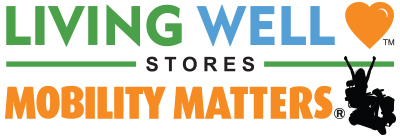Once you have experienced the freedom that a scooter provides, you’ll want to take it with you everywhere. First, let’s talk about safety and security.
This article starts with general guidelines for travel. Then it talks about things to consider when traveling by car or van with your scooter. Even short trips can be more comfortable when you follow these helpful tips.
If you are planning to travel by air, check out Know Before You Go – Traveling by Car with your Power Scooter or Wheelchair on our website. We have included information using your scooter with Uber and Lyft services as well.
General Guidelines.
- Just like at home, operate your scooter as if you were walking. That means ride on the places where people walk except when crossing streets. When traveling, it’s always more pleasant to have some of your own personal things. Scooters are no exception. While you can rent a scooter, the rental is going to be basic.
- Folding scooters are a tempting option. Most fold into the shape similar to a rolling suitcase. They can be stowed away in a hotel room closet. But you should be aware that folding scooters have limits. They don’t come apart like portable scooters, so you’ll need to be prepared to lift 70-90 lbs. Also, you’ll pay extra for their folding design. Lastly, airlines and cruise ship staff can be brutal on the scooter’s relatively delicate folding parts when stowing them. We’ll be writing specifically about folding scooters in a future article.
- Helpful accessories – Get a cover for your scooter in case you run into weather and can’t bring the scooter indoors. A lost or damaged battery charger is sure to put a damper on your trip. Spare battery chargers are not that expensive.
- Transportable scooters are super-convenient but they’re best for smooth, man-made surfaces like tile, carpet, and asphalt. If you think you’ll be riding on broken and uneven concrete sidewalks, cobblestones, etc., consider a full-sized scooter.
- Be prepared for whatever type of weather is typical for the area you are visiting.
Taking your scooter on commercial airplanes
Traveling by air with a power scooter or power wheelchair isn’t difficult, but there are things you need to know:
- The U.S. Department of Transportation rules require that your scooter, as an assistive device, be stowed at no additional cost to you!
- When booking your flight, see if the airline has a “Special Assistance” indicator for you to check. That way the airline personnel will have advance notice of any additional assistance you may need getting onto their aircraft.
- Contact your airline in advance to see how they handle scooters and power wheelchairs. Find out if any paperwork will be required to go with your device on the plane. The forms will ask you to provide specific information about the type of battery in your machine, how to collapse the machine, if applicable, and your recommendations on how to lift it. A list of websites for some of the more common airlines is provided at the end of this article.
- The most important consideration for you to be aware of is the type of battery your mobility device uses. Airline staff is trained in the safe handling of the types of batteries installed in scooters. They may ask you what type you have so they can safely handle it. The majority of scooters use Sealed Lead Acid (SLA) gel batteries. A few (mostly folding scooters) use Lithium-Ion batteries. If you’ve purchased your scooter from us, you can get the information and documents right from our knowledge base.
- Other questions you may be asked are how to fold or disassemble (if required for storage) the machine; how to place it in neutral for steering; and ensuring you have turned it off and retained the key. You do not want to leave the key in the machine and risk it being turned on and the battery draining.
- With a few exceptions (certain folding scooters), your scooter will be stowed in the cargo hold during travel and returned to your arrival gate after landing. Let airline staff know if you will require wheelchair assistance to board and depart the aircraft.
- If you want to know more about traveling with battery-powered devices, read this important document from the International Civil Aviation Organization (ICAO), – Battery Powered Wheelchair and Mobility Aid Guidance Document (based on the 2019 regulations), https://www.iata.org/whatwedo/cargo/dgr/Documents/mobility-aid-guidance-document-2019-en.pdf. The link is also provided at the end of this article.
- Check with your homeowner's insurance to see whether your device is covered for airline travel. Ask what restrictions or requirements may apply. In the unfortunate event that your device is lost or damaged, each airline has a process for filing a claim. Ask an airline customer service rep how claims are handled. Thorough documentation will be required, which is why it’s so important to retain copies of any travel documents throughout your trip.
- Write important information on a durable card that securely attaches to your machine. Keep a copy of all the documents with you, including the serial number for your scooter.
- Remove and pack detachable items. This includes cupholders, seat cushions, or side guards. If they are too large to carry on or pack in your luggage, package and label them to be checked separately.
- At check-in, allow at least an hour more than if you were not checking a mobility device. Some airports require you to deliver your device at a specific location. We recommend that you contact the specific airline to ask what their current requirements are – remember, websites can be out of date due to changes or construction.
- When you arrive at the airport, you will be required to check your scooter with the completed paperwork. Notify the airline in advance if you need their wheelchair service to get to your gate and on the plane. The airlines will schedule these services for connecting flights too.
This article was inspired by a shocking news story of a man who, despite following all of the steps in this article, met with resistance, inexperience, and rudeness from the airline he was traveling on with his mobility device. You can read about his unfortunate experience at this link.
Since each airline has its own process for being notified of special assistance with mobility devices, we have assembled this handy list of links for your reference. We have also included the link to the FAA’s list of hazardous materials and the International Civil Aviation Organization’s instructions for traveling with battery-powered wheelchair and mobility devices.
If your airline is not listed, just search by entering the name of your airline and “mobility device” in your favorite search engine.
|
Links to Airline Requirements for Mobility Scooter and Wheelchairs |
|
Alaska Airlines https://www.alaskaair.com/content/travel-info/accessible-services/specialservices-wheelchair |
|
Allegiant https://www.allegiantair.com/passengers-special-needs - From this link, scroll down to the heading Passengers with Special Needs, then “About the process for boarding with a battery operated device.” |
|
American Airlines – contact Special Assistance https://www.aa.com/i18n/customer-service/contact-american/special-assistance.jsp |
|
Delta Airlines https://pro.delta.com/content/agency/us/en/policy-library/government-tsa/batteries.html |
|
FAA PackSafe for Passengers – the FAA’s chart on hazardous materials, including varies battery types. |
|
Frontier Airlines https://www.flyfrontier.com/travel/travel-info/special-services/ |
|
International Civil Aviation Organization (ICAO) – Battery Powered Wheelchair and Mobility Aid Guidance Document (based on the 2019 regulations) https://www.iata.org/whatwedo/cargo/dgr/Documents/mobility-aid-guidance-document-2019-en.pdf |
|
JetBlue |
|
Southwest Airline |
|
Spirit https://customersupport.spirit.com/hc/en-us/articles/115000247352-Traveling-with-Your-Wheelchair-or-Mobility-Aid-h |
|
United Airlines Traveling with a wheelchair or other assistive devices: https://www.united.com/ual/en/us/fly/travel/special-needs/disabilities/customer-wheelchair.html All special travel needs – has information on other services that may be of interest or help make your travel easier: https://www.united.com/ual/en/us/fly/travel/special-needs.html |
By making sure your scooter is in top-notch condition to travel, and by bringing the accessories that make you comfortable, you can enjoy the same mobility freedom you enjoy when traveling at home.
Happy travels from Living Well Stores!













